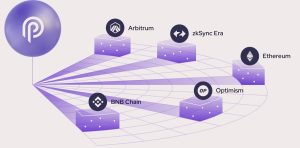
Introduction to How Pyth V2’s Pull Oracle Launch Will Revolutionize DeFi.
- Decentralized Finance (DeFi) has revolutionized the financial landscape by providing decentralized alternatives to traditional financial services. At the heart of this transformation are oracles, which bridge the gap between blockchain ecosystems and real-world data. As the DeFi space continues to evolve, the choice of oracle infrastructure becomes increasingly critical. This article explains why DeFi protocols should consider migrating from traditional push oracles to innovative pull oracles, with a particular focus on the Pyth Network, and evaluates the implications of such a transition.
Now Let’s Explain What Is Oracles in DeFi.
- Oracles are entities or systems that provide external data to blockchain smart contracts. This data can include asset prices, weather conditions, sports scores, and more. Without oracles, smart contracts would be unable to access real-world information, significantly limiting their utility. Oracles play a crucial role in DeFi by enabling smart contracts to interact with off-chain data, ensuring that decentralized applications operate accurately and reliably.
- Oracles can be categorized into two main types: push oracles and pull oracles. Push oracles periodically update the blockchain with new data, regardless of whether it is immediately needed. In contrast, pull oracles update data only when explicitly requested by users or applications.Let’s Discuss Push vs. Pull Oracles
PUSH Oracles
Mechanism: Data Submission
– Data operators periodically update the blockchain with new data at predefined intervals, such as every 10 minutes or every hour.
– Update Frequency: Fixed, with updates occurring at regular intervals regardless of immediate demand.
– Data Flow: Operators push data to the blockchain regardless of whether it is immediately needed, resulting in unnecessary updates and waste.
Advantages Of PUSH Oracles:
– Consistency: Regular updates ensure that data is consistently available, even if it is not immediately needed.
– Automation: Reduces the need for user intervention in updating data, making it a convenient option.
Disadvantages Of PUSH Oracles:
– Resource Intensive: Continuous updates can incur high transaction fees and consume significant network resources, leading to increased costs and congestion.
– Inefficiency: Data is updated even when not immediately required, resulting in potential waste and inefficiency.
– Scalability Issues: Limited by the gas costs and logistical challenges of updating data across multiple blockchains, making it difficult to scale.
PULL Oracles
Mechanism: Data Request
– Data is updated on-chain only when explicitly requested by users or applications, reducing unnecessary updates and waste.
– Update Frequency: On-demand, with updates occurring at high frequencies only when needed.
– Data Flow: Users pull data when needed, reducing unnecessary updates and optimizing resource use.
Advantages Of PULL Oracles:
– Efficiency: Updates occur only when necessary, reducing waste and optimizing resource use.
– Cost-Effective: Lower overall costs due to reduced transaction volume and minimized waste.
– Scalability: Can support high-frequency updates and is adaptable across various blockchains, making it a scalable option.
– Decentralization: Anyone can request and update data, enhancing the network’s resilience and trustworthiness.
Disadvantages Of PULL Oracles:
– Initial Latency: There might be a delay in data availability if the request and update process is not instantaneous.
– User Dependency: Relies on users or applications to trigger updates, which requires robust mechanisms to ensure timely data requests.
Now Let’s Discussed What Pyth Network Is All About:
The Pyth Network, a pioneering first-party financial oracle, is launching its V2 pull oracle iteration on Solana mainnet-beta, marking a significant milestone in the evolution of Solana DeFi. This transition from the push oracle model to the pull oracle design will bring about a paradigm shift in the way Solana DeFi protocols interact with price feeds, unlocking new possibilities for growth, efficiency, and innovation. In this article, we will delve into the implications of Pyth V2’s launch on Solana mainnet-beta and explore how it will benefit Solana DeFi.
Background: Pyth Network
Pyth Network, launched in April 2021, has established itself as the largest and fastest-growing financial oracle, providing real-time asset price data to over 55 blockchain ecosystems. Initially, Pyth Network operated as a push oracle on solana, where data providers posted price updates directly to Solana mainnet-beta. However, with the launch of Pyth V2, a pull oracle designed on the Pythnet appchain, DeFi protocols will now pull price updates from Pythnet, aligning with the new paradigm.
Benefits of Pyth V2’s Pull Oracle
1. On-Demand Price Updates: Pyth V2’s pull oracle design enables DeFi protocols to request the latest price updates on demand, ensuring that they always have access to the most recent and accurate data. This feature is particularly crucial in high-frequency trading and other applications where timely data is essential.
2. Improved Efficiency: By transitioning from a push oracle to a pull oracle, DeFi protocols can optimize their resources and reduce unnecessary overhead. This change will lead to increased efficiency, as protocols only need to update prices when required, rather than constantly receiving push updates.
3. Enhanced Security: Pyth V2’s pull oracle design introduces an additional layer of security, as Solana DeFi protocols can now verify the authenticity of price updates before accepting them. This added security measure will help prevent potential attacks and ensure the integrity of the ecosystem.
4. Increased Interoperability: With Pyth V2’s pull oracle, DeFi protocols can seamlessly integrate with other blockchain ecosystems, fostering greater interoperability and collaboration. This development will pave the way for novel use cases and innovative applications.
5. Scalability and Growth: Pyth V2’s launch will unlock new possibilities for scalability and growth in DeFi. As more protocols adopt the pull oracle design, the ecosystem will become more robust, attracting new participants and driving innovation.
6. Real-Time Data Access: Pyth’s pull oracle design enables real-time price updates, which are crucial for sophisticated financial applications.
7. Cost Efficiency: By updating data only when requested, Pyth minimizes unnecessary transactions, significantly reducing gas costs and network congestion.
Quantitative Evidence of Pull Oracle:
– PUSH Oracles: Assume an oracle updates prices every 10 minutes on Ethereum, incurring an average gas fee of $10 per update. Over a month, this results in approximately $43,200 in gas fees.
– PULL Oracles – Pyth V2’s Pull Oracle: If updates are requested only when necessary (e.g., during active trading hours, totaling 8 hours per day), the number of updates can be reduced by 67%, saving significant costs.
Some Examples:
– DeFi Lending Platforms:
Push Model: Regular updates ensure data is available but can lead to inefficiencies during low activity periods.
Pull Model Pyth V2’s Pull Oracle: Data is updated precisely when needed, optimizing resource use and ensuring accurate collateral valuations in real-time.
– Decentralized Exchanges (DEXs):
Push Model: High latency can result in inaccurate pricing, leading to slippage and arbitrage opportunities.
Pull Model Pyth V2’s Pull Oracle: Real-time updates reduce latency, providing more accurate pricing and better trading experiences.
Case Study: Pyth V2’s Pull Oracle`s Impact on DeFi Lending Platforms
– Background: DeFi lending platforms rely on accurate and timely data to ensure proper collateral valuation and liquidation.
– Challenge: Push oracles can lead to inefficiencies during low activity periods, resulting in wasted resources and potential errors.
– Solution: Pyth V2’s Pull Oracle updates data precisely when needed, optimizing resource use and ensuring accurate collateral valuations in real-time.
– Results: DeFi lending platforms integrated with Pyth V2’s Pull Oracle have seen significant improvements in efficiency, cost savings, and scalability.
Conclusion
- The launch of Pyth V2’s pull oracle marks a significant milestone in the evolution of DeFi. By transitioning from a push oracle to a pull oracle design, DeFi protocols will experience improved efficiency, enhanced security, and increased interoperability. As the DeFi ecosystem continues to grow and mature, Pyth V2’s pull oracle will play a vital role in unlocking its full potential.Recommendations– DeFi protocols should consider migrating from push to pull oracles to optimize resource use and reduce costs.
– Developers should design applications that leverage pull oracles to ensure accurate and timely data.
– Users should support DeFi protocols that adopt pull oracles, promoting efficiency and decentralization in the ecosystem.Final ThoughtsThe future of DeFi relies on the adoption of innovative technologies like pull oracles. Pyth V2’s Pull Oracle design has set a new standard for oracle infrastructure, and its impact will be felt across the DeFi ecosystem. As we continue to push the boundaries of decentralized finance, it is essential to prioritize efficiency, scalability, and decentralization. The transition to pull oracles is a crucial step in this journey, and Pyth V2’s Pull Oracle is leading the way.
Socials And All Doc Links Below
Pyth Network Twitter: https://twitter.com/PythNetwork
Pyth Network Discord: https://discord.com/invite/PythNetwork
Pyth Network Telegram: https://t.me/Pyth_Network
Pyth Network Website: https://pyth.network/
Pyth Network Documentation: https://docs.pyth.network/
Pyth Network GitHub: https://github.com/Pyth-Network
Read More
